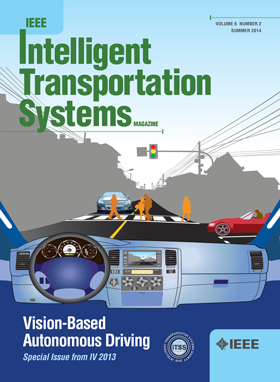Performance-Prescribed Optimal Control for Target Enclosing of Vehicles via Control Barrier Function-Based Reinforcement Learning
IF 7.9
1区 工程技术
Q1 ENGINEERING, CIVIL
IEEE Transactions on Intelligent Transportation Systems
Pub Date : 2025-02-20
DOI:10.1109/TITS.2025.3540652
引用次数: 0
Abstract
The target enclosing control problem for autonomous vehicles with uncertainties necessitates simultaneous consideration of control optimality, robustness, and safety-guided performance constraints. This paper presents a performance-prescribed optimal control algorithm using control barrier function (CBF)-based reinforcement learning (RL) to address the above problem, which contains two key contributions. First, a special CBF-based argument term is developed and embedded into the reward function to characterize environmental feedback regarding the risk of violating constraints, which enables the controller to confine enclosing errors within declared boundaries with minimal intervention. Second, a critic-only neural network is utilized to synthesize the optimal control policy, where a novel fixed-time updating law is presented to accelerate the weight convergence to ideal values within a fixed settling time, thereby enhancing the online learning ability and further improving control performance. Theoretical outcomes related to learning convergence, safety, stability, and robustness are rigorously verified. Simulations reveal that the proposed strategy outperforms the previously designed enclosing controllers based on the non-RL and RL ways in terms of complying with prescribed safety constraints and optimizing long-term performance.基于控制障碍函数的车辆目标封闭性能最优控制
具有不确定性的自动驾驶汽车目标封闭控制问题需要同时考虑控制最优性、鲁棒性和安全引导性能约束。本文提出了一种基于控制屏障函数(CBF)的强化学习(RL)的性能规定最优控制算法来解决上述问题,其中包括两个关键贡献。首先,开发了一个特殊的基于cbf的参数项,并将其嵌入到奖励函数中,以表征关于违反约束风险的环境反馈,这使控制器能够以最小的干预将封闭错误限制在声明的边界内。其次,利用纯临界神经网络综合最优控制策略,提出了一种新的固定时间更新律,在固定的沉降时间内加速权值收敛到理想值,从而增强了在线学习能力,进一步提高了控制性能;与学习收敛性、安全性、稳定性和鲁棒性相关的理论结果得到了严格的验证。仿真结果表明,该策略在遵守规定的安全约束和优化长期性能方面优于先前设计的基于非RL和RL方法的封闭控制器。
本文章由计算机程序翻译,如有差异,请以英文原文为准。
求助全文
约1分钟内获得全文
求助全文
来源期刊

IEEE Transactions on Intelligent Transportation Systems
工程技术-工程:电子与电气
CiteScore
14.80
自引率
12.90%
发文量
1872
审稿时长
7.5 months
期刊介绍:
The theoretical, experimental and operational aspects of electrical and electronics engineering and information technologies as applied to Intelligent Transportation Systems (ITS). Intelligent Transportation Systems are defined as those systems utilizing synergistic technologies and systems engineering concepts to develop and improve transportation systems of all kinds. The scope of this interdisciplinary activity includes the promotion, consolidation and coordination of ITS technical activities among IEEE entities, and providing a focus for cooperative activities, both internally and externally.
 求助内容:
求助内容: 应助结果提醒方式:
应助结果提醒方式:


